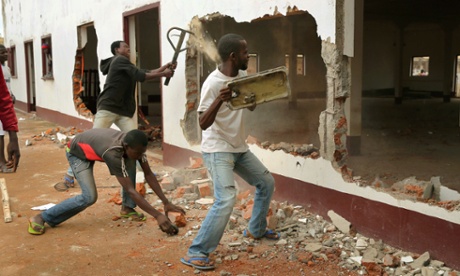Here we are, in the 4th straight day of violence in Goma where I am living / working.. All morning, we have heard hundreds of gunshots in several directions from our office / house. There has been at least 1 death here today, and probably more.
Below is a BBC article from today concerning the violence in general in DRC, and specifically in Goma, The violence started after a vote this weekend to change the elections calendar, linked to a proposed census (see below). But the students in Goma got angry with the arrest of a couple of university professors, who happen to be part of the opposition, during Monday's manifestations against the new calendar. And they got even angrier when internet and telephone text messaging was shut down. (Fortunately for our organization, our internet provider's antenna is located in neighboring Rwanda.)
***************
The BBC's Maud Jullien says hundreds of students in Kinshasa are determined to maintain their protest
Clashes have erupted in Goma in eastern Democratic Republic of Congo because the internet has been cut off since Tuesday, witnesses have told the BBC.
Hundreds of angry protesters took to the streets demanding it be restored, along with text messaging services.
They also called for the release of those arrested this week in nationwide demonstrations against President Joseph Kabila extending his rule.
Witnesses said live ammunition was used to disperse the crowd.
It is the fourth day of unrest in DR Congo in connection with a government plan for a census before elections due next year.
 People were detained in Goma during protests which began on Monday
People were detained in Goma during protests which began on Monday
Human rights groups say 40 people have been killed but the government says the true figure is 11, including one policeman.
Clashes in Goma were reported at Katindo military camp, at the vice governor's office and several other districts of the city on Thursday.
Protesters erected barricades with burning tyres and threw stones while the security forces shot into the air and used tear gas.
One witness said presidential guards, who are not normally assigned to manage protests, supported the police.
Mr Kabila first took power in 2001 following the assassination of his father Laurent, who was president at the time, and is constitutionally barred from running for another term.
The opposition say the census is a ploy for him to hang on to power as it will take about three years for it to be conducted in DR Congo, which is two-thirds of the size of western Europe, has very little infrastructure and is hit by instability in the east.
The government admits the election could be delayed, but says the census is vital to ensure polls are free and fair.
On Wednesday, the Catholic Church, the largest in DR Congo, called on people to peacefully oppose the move.
It also shut its schools because of the violent protests in the capital, Kinshasa,
The BBC's Maud Jullien in Kinshasa says the clashes come as the Senate continues to examine the controversial electoral bill.
The lower chamber, the House of Representatives, approved the plan for a census on Saturday, in a vote boycotted by opposition MPs.
The opposition says this amounts to a "constitutional coup" by Mr Kabila.
DR Congo, formerly known as Zaire, has never had a reliable census since independence from Belgium in 1960.








